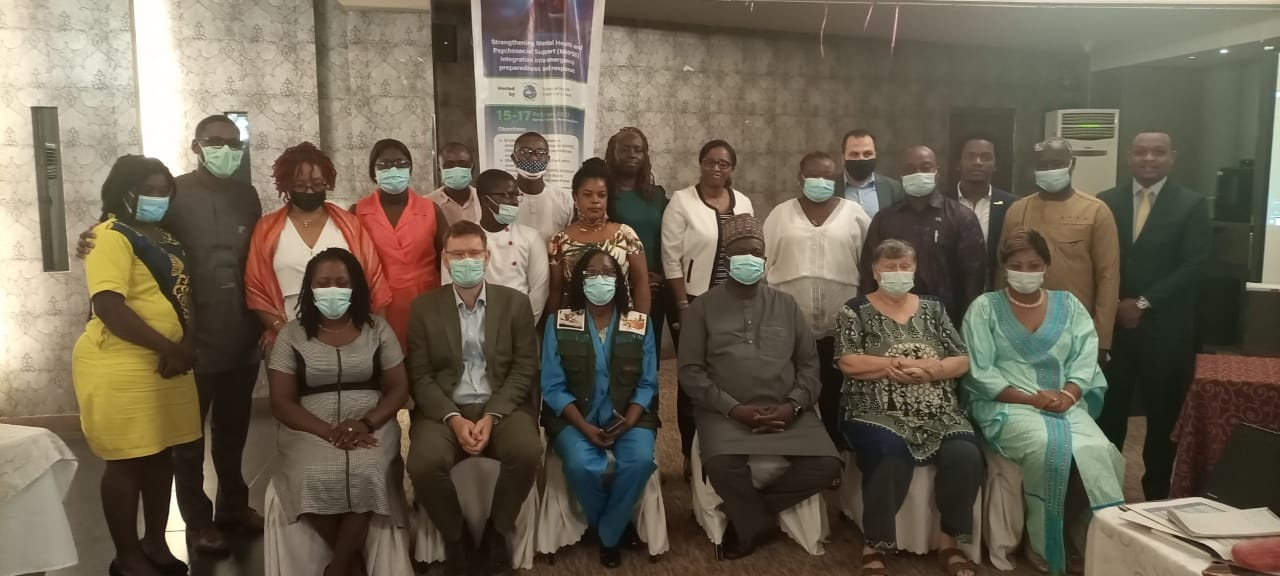
Although mental health affects everyone, whether it’s people trying to maintain their mental wellbeing or those living with a mental health condition, it is often forgotten about in the response to a public health emergency. This is particularly a problem in countries where services are already limited. Before the COVID-19 pandemic, resources allocated to mental health were scarce, with a median of 2% of government expenditure allocated to mental health across the world. During the pandemic, more resources were shifted towards managing COVID-19 infections, making the existing care gap even wider - in a global survey by the World Health Organization (WHO), 93% of 130 countries surveyed reported substantial disruption to their mental health services during the pandemic.
The UK-PHRST has a dedicated Mental Health and Psychosocial Support (MHPSS) team that works particularly across the African and the Eastern Mediterranean regions, on projects ranging from research and capacity strengthening activities to deployments.
The team works to integrate mental health into outbreak response plans and procedures, to improve the mental health and psycho-social wellbeing of people affected, including staff from organisations assisting on the ground – a direct response to the serious impact that these events can have on individuals and communities. During the COVID-19 pandemic in 2020 for instance, global prevalence of depression and anxiety disorders increased by a quarter, with the WHO stating the pandemic “had a severe impact on the mental health and wellbeing of people around the world”.
Strengthening existing MHPSS guidance in outbreaks through research
The team has a diverse research portfolio split into four main phases:
- Phase 1: Identify the needs, resources and current interventions for MHPSS across the African continent
- Phase 2: Work with stakeholders to explore how to better support existing MHPSS frameworks to adapt them into location and outbreak specific response tools
- Phase 3: Test the proposed MHPSS interventions in an outbreak scenario
- Phase 4: Produce a package of MHPSS interventions as a best practice guide which can be applied to specific outbreak situations
The team has already started to see real progress thanks to its research. For instance, members of the UK-PHRST team worked with a consortium of public health institutions in Africa including the Africa Centre for Disease Control (Africa CDC), World Health Organization African Region (WHO AFRO), WHO Regional Office for the Eastern Mediterranean (WHO EMRO) on the Strengthening Public Mental Health in Africa in Response to Covid-19 (SPACE) programme. The programme aimed to help integrate MHPSS into African countries’ emergency responses by exploring the extent to which MHPSS was already included in the national response to the COVID-19 pandemic in African countries. The consortium also examined the barriers and enablers to MHPSS integration in the COVID-19 response. Based on their findings, they recommend five key areas to target for improving mental health integration into the response to public health emergencies. The SPACE programme also acted as a catalyst to the development of working partnerships with regional health bodies and the establishment of an informal network of MHPSS experts across Africa. The research project, alongside other evidence sources, helped inform Africa CDC’s decision to integrate MHPSS into its strategic plan for emergencies.
Building recognition for MHPSS in outbreak response through capacity strengthening
In many countries, current outbreak response infrastructure and national outbreak response plans do not incorporate MHPSS measures. Through its capacity strengthening work, the UK-PHRST MHPSS team actively advocates for MHPSS to be included as part of national outbreak response plans with key health leaders, the strengthening of local co-ordination capabilities and dedication of resources to the area. For example, the team collaborate with Africa CDC to organise workshops throughout African regions to build recognition for the importance of MHPSS in outbreaks, while also taking the opportunity to learn from national MHPSS and emergency response leads to better understand how MHPSS can fit into a local context. In February 2022, the Liberian Ministry of Health, Africa CDC and the UK-PHRST MHPSS team hosted a three day regional workshop bringing together mental health experts from institutions in Africa and worldwide with national mental health leads from Liberia, Sierra Leone, Cameroon and Nigeria. The workshop aimed to build a knowledge and expertise sharing regional network whilst also developing a Theory of Change model for integrating mental health into national emergency preparedness and response plans.
Finally, the team have also worked directly with organisations like Africa CDC’s African Volunteers Health Corps (AvoHC) to add MHPSS to the list of expertise they provide in public health emergencies in the continent and contributed to WHO Eastern Mediterranean Region’s MHPSS action plan.

Group attendees of UK-PHRST, Liberian Ministry of Health and Africa CDC Regional MHPSS Workshop. Image credit: Mental Health Innovation Network/Liberian Ministry of Health
Making MHPSS expertise part of outbreak deployments
A lack of global prioritisation for MHPSS during outbreaks, coupled with limited funding and understanding of its benefits, means that MHPSS experts are often not requested during an outbreak response call.
To address this, the UK-PHRST team is actively working to strengthen deployment mechanisms for rapid response, through collaboration AvoHC and IASC/Dutch Surge Support mechanisms. As a part of this collaboration, a group of MHPSS professionals will be trained and prepared to be deployed to ensure that MHPSS is an integral part of the outbreak response.
MHPSS deployments would allow a country to bring in experts to increase its preparedness and response capacity for mental health during an outbreak, allowing other in-country response teams to prioritise the other public health measures that are also required.
Work with the UK-PHRST MHPSS team
If you would like to find out more about the MHPSS team within the UK-PHRST, including how to collaborate or request their help during an outbreak please contact uk-phrst@lshtm.ac.uk.